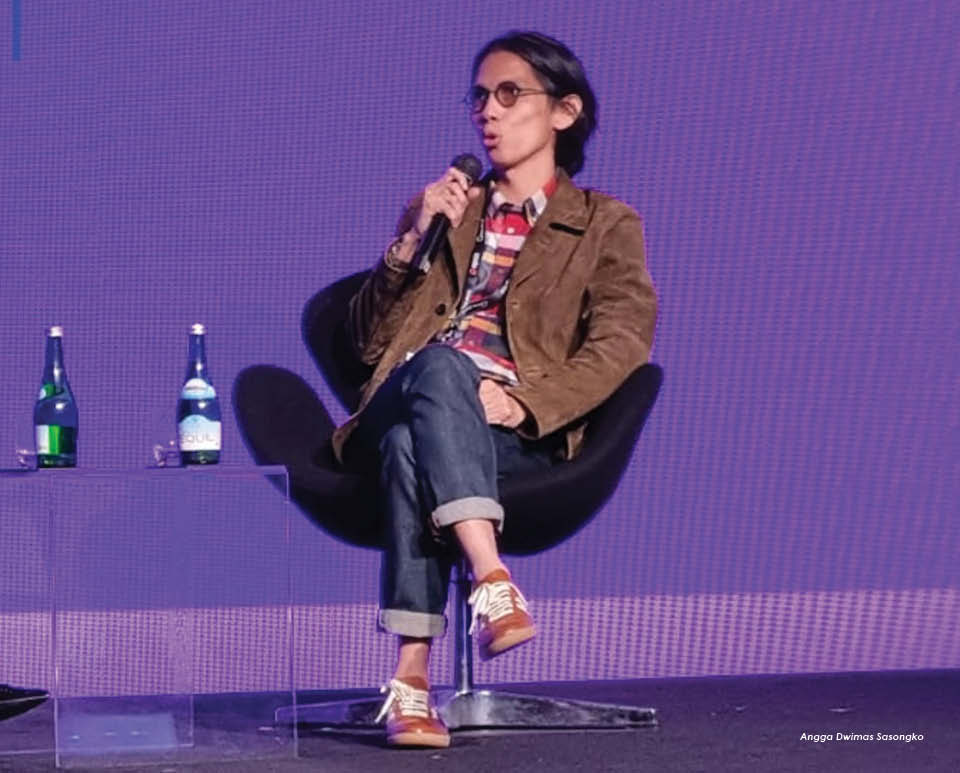
Potential for even further growth across Indonesia’s media and entertainment industries remains huge, APOS delegates were told in the final afternoon of this year's convention in Bali on Thursday.
“Indonesians are very diverse emotionally and culturally. We [creators] need to understand that. There is a huge untapped market in Indonesia. We need to stop focusing on trends and simply search for the opportunities,” said Visinema head, Angga Dwimas Sasongko.
Other Indonesian speakers were similarly upbeat, though they expressed their hope from different angles.
Remakes, gaming and micro dramas are all fertile ground, Falcon Studios' head, HB Naveen, said.
“When I learned about value investing, I understood that we were making too many films. We had a problem of over capitalisation, which forced us to chase growth... Instead, I look at where the viewers were going," he said.
Digital technology and social media means barriers have been lowered. “You don’t need much capital, but you do need intellectual capital,” Naveen added.
Falcon is mining existing regional IP for possible remakes; Indonesian versions of Thai hit films “Pee Mak” and “Shutter” are in the pipeline.
The company will also venture into micro-drama and will exploit existing properties such as “My Stupid Boss” in gaming and consumer goods formats.
Sasongko said that the recent theatrical success of Visinema’s animated feature film “Jumbo” proved Indonesian audiences were ready for greater content variety.
“They are not waiting for a global voice. They can have joy and experience from the place they were born in and grew up in. Give them quality,” he said.
Restructured in 2018, Visinema now has multiple production units spanning different genres (horror, content for second tier cities, etc.), but has a central committee to decide what output is worthy of theatrical release.
Actress-turned-producer Prilly Latucon at Sinemaku Pictures, said “audiences are smarter than we had thought", which le...
Potential for even further growth across Indonesia’s media and entertainment industries remains huge, APOS delegates were told in the final afternoon of this year's convention in Bali on Thursday.
“Indonesians are very diverse emotionally and culturally. We [creators] need to understand that. There is a huge untapped market in Indonesia. We need to stop focusing on trends and simply search for the opportunities,” said Visinema head, Angga Dwimas Sasongko.
Other Indonesian speakers were similarly upbeat, though they expressed their hope from different angles.
Remakes, gaming and micro dramas are all fertile ground, Falcon Studios' head, HB Naveen, said.
“When I learned about value investing, I understood that we were making too many films. We had a problem of over capitalisation, which forced us to chase growth... Instead, I look at where the viewers were going," he said.
Digital technology and social media means barriers have been lowered. “You don’t need much capital, but you do need intellectual capital,” Naveen added.
Falcon is mining existing regional IP for possible remakes; Indonesian versions of Thai hit films “Pee Mak” and “Shutter” are in the pipeline.
The company will also venture into micro-drama and will exploit existing properties such as “My Stupid Boss” in gaming and consumer goods formats.
Sasongko said that the recent theatrical success of Visinema’s animated feature film “Jumbo” proved Indonesian audiences were ready for greater content variety.
“They are not waiting for a global voice. They can have joy and experience from the place they were born in and grew up in. Give them quality,” he said.
Restructured in 2018, Visinema now has multiple production units spanning different genres (horror, content for second tier cities, etc.), but has a central committee to decide what output is worthy of theatrical release.
Actress-turned-producer Prilly Latucon at Sinemaku Pictures, said “audiences are smarter than we had thought", which led her to consider greater respect and investment in soap operas.
“Sometimes we are scared [of social issues] We don’t feel we have that freedom to talk about domestic violence, sexual harassment and political conditions in Indonesia. [..] But even horror stories can be used as an exploration of grief,” she said.
“Rapid technological changes are causing changes in audience behaviour – they have shorter attention spans and wider references,” she added. This means the company should be flexible about theatrical or OTT releasing hierarchies, expanding into premium series and international co-production.
Imajinari's Ernest Praksa said producers shouldn't bet against Indonesia’s horror genre, which is both a local staple and a consistent export success.
“I don’t think there will be a horror fatigue in Indonesia. It is ingrained in our culture,” he said.
“But I do think that we are becoming too IP driven. We really need to come up with as many original stories as possible. And we need bigger budgets to do epic or period dramas.”
Mark Francis, Vidio's chief content officer, noted opportunity in every direction and a wealth of Indonesian talent.
“In many countries they had 15 years of premium pay-TV. In Indonesia we leaped directly from free-to-air to paid subscription models," he said, highlighting Vidio's aim to be the best aggregator of content and the ongoing effort to understand local audiences.
The company’s slate this year ranges from sport, seen as an audience acquisition tool, though to an anticipated 14 series in the current year, feature films that hold a mirror to the country’s diversity, and even micro dramas.
“We launched these in April as a pilot. There is lots of promise, but It won’t be as easy as taking [the concept] from China and expecting it to work in Indonesia. A lot of micro dramas feel like an extension of social media, rather than a reduction of long form television.” – By Patrick Frater































